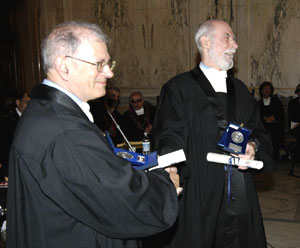Laurea specialistica honoris causa in Ingegneria informatica a Vinton G. Cerf e Robert E. Kahn
 Il 26 maggio 2006 l'Università di Pisa ha conferito la laurea specialistica honoris causa in Ingegneria informatica a Vinton G. Cerf e Robert E. Kahn.
Il 26 maggio 2006 l'Università di Pisa ha conferito la laurea specialistica honoris causa in Ingegneria informatica a Vinton G. Cerf e Robert E. Kahn.
- Discorso del Magnifico Rettore
- Profilo di Vinton G. Cerf
- Profilo di Robert E. Kahn
- Laudatio del Prof. Luciano Lenzini
- Motivazione del conferimento
Lectio Doctoralis - Vinton G. Cerf
Abstract
Internet technology and policy challenges
The Internet has expanded from its earlier origins to span the globe and to serve an estimated one billion users.
Its basic packet switching technology and increasing speeds and capacity have permitted it to become a general purpose transport system for every kind of digital information including streaming audio, video and interactive applications.
It has enabled new ways to deliver entertainment and remarkable ways to discover and correlate information.
The enormous amount of information flowing into the Internet through the World Wide Web has transformed the conduct of science, created new forms of personal interaction among groups and between individuals, and created new opportunities for the management of all kinds of devices. It is having notable impact on political campaigns and creating new opportunities for government at all levels to interact with, inform, and serve the general public.
As the first decade of the 21st Century unfolds, we are seeing not only a flowering of online technology but also a significant focus on policy issues that these technologies provoke. Intellectual property management in the online world has created opportunity and challenge as has the potential for various forms of abuse (spam, denial of service attacks, viruses, worms, and fraud of all kinds). The governance of the Internet or at least of its use and abuse has become an important international focus that will occupy the rest of the decade with wide ranging debate.
Finally, the Internet's technology can be adapted to support deep space exploration, bringing scientific information from the rest of the solar systems to our desktops and fingertips. This lecture will conclude with a summary of the use of Internet in solar system exploration.
Scarica le slides in powerpoint della lectio doctoralis di Vinton G. Cerf (3,5 MB)
Lectio Doctoralis - Robert E. Kahn
Abstract
The Internet: Past, Present and Future
The Internet had its origins in a technological challenge brought on by the introduction of multiple packet communication networks. Given a number of different networks, how could they be integrated into a seamless whole such that users and their computers on one network could easily communicate reliably with other networks in a simple and straightforward fashion, despite all the difference in technology, routings, platforms and the like.
From early applications such as email and file sharing, the success of the Internet in achieving reliable global communications connectivity has focused attention on the provision of services, development of new applications and support for standards development. The importance of information management on the net has become increasingly evident. Less obvious, perhaps, is the importance of open architecture.
The World Wide Web provided a working example of how to simplify information access on the net, and with the "point and click" capability of Web browsers, it quickly became a de facto standard for making information available. However, there are still many limitations with this approach.
One is that a typical user does not know what he can and/or cannot do with information accessed over the net. A second is that the "half-life" of information made available via URLs is relatively small and not ideal for long-term information preservation and access.
Most users and organizations are uncomfortable trusting their personal information as well as other important materials to services on the net for reasons of privacy, security, and reliability.
And finally, even if none of these concerns were to exist, the amount of information stored may become sufficiently large that it cannot be effectively accessed by traditional means of "viewing" such information.
Therefore, more sophisticated methods for access will be essential, that can lead with certainty to specific pieces of information, such as medical records, where required.
The role of the Digital Object Architecture in managing information on the net will be discussed along with its open architecture attributes. The components of this architecture will be reviewed along with their possible applications.
The role of identifiers for "data structures" will be discussed, along with repositories for storage, accessing and sharing of information, and recent developments exploring possible connections between the Handle System and the DNS.
Scarica le slides in powerpoint della lectio doctoralis di Robert E. Kahn (311 KB)
Ultimo aggionamento documento: 20-Dec-2006

